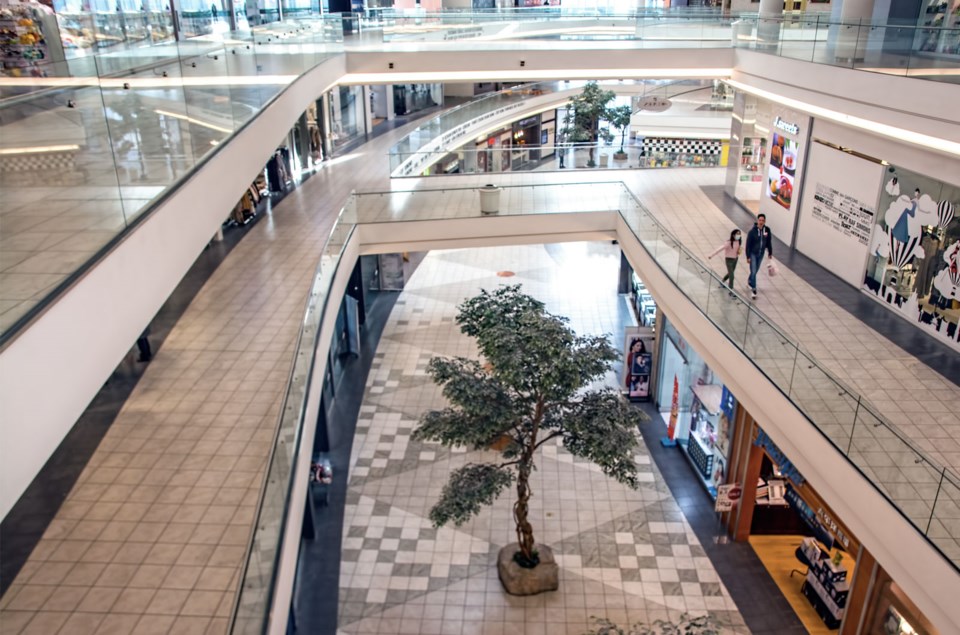In a national survey taken just before the coronavirus, COVID-19, became headline news, more than a quarter of Canada’s commercial lenders said they intended to decrease their exposure to retail loans.
“Since 2016, the number of respondents that wholly discounted retail assets from their budgets has grown steadily to 39.1 per cent of lenders in 2019,” noted the Canadian Real Estate Lenders Survey from CBRE. Looking ahead to 2020, “lenders continue to be cautious regarding retail transactions,” the report found.
That caution may turn to concern as a China-sourced virus that, as of February 12, has killed 1,300 people and infected more than 45,000 worldwide, was declared a global health emergency by the World Health Organization.
COVID-19 has locked down 50 million Chinese citizens and chilled consumer shopping and tourism around the world.
Manuel Bernaschek, who owns the Stefano Ricci store on West Georgia Street near the Trump International Hotel & Tower Vancouver, estimated that about 35 per cent to 40 per cent of his customers are visitors to Vancouver from China.
He is anticipating that there may be a slowdown in the weeks ahead but that things will then get back to normal.
Malls to feel bigger impact
“The disease has to become much bigger locally for it to impact retailers,” said DIG360 owner and retail analyst David Gray.
“Malls will be the first to feel the impact, versus street-front retailers, but I think it has to be a lot more significant than where we are right now.”
If a spate of new cases of infection arises, and particularly if there are B.C. deaths, Gray expects that people will be wary of going to public gatherings.
He believes consumers are being cautious about the disease but viewing it as being far away and not yet something that they need to fear.
“We might be washing our hands more, and we’re probably more alert if someone is coughing around us, but I wouldn’t expect that there is much of an impact yet.”
Coffee shops and other public meeting places could be hit, he suggested.
Starbucks Corp.’s shares slid more than two per cent on January 29, a day after it told investors that it has closed “more than half” of its 4,123 stores in China, a country that represents about 10 per cent of its global revenue.
“The business impact is largely a function of two things: the number of stores closed and the duration of closure, and with respect to the duration of closure, it’s not entirely in our control,” Starbucks CFO Pat Grismer said on a conference call.
“We’re probably looking at early March at the earliest to reasonably assess the implications for revenue, operating income and earnings per share for our second quarter and for the full year.”
The SARS precedent
There are precedents for economic slowdowns as a result of global pandemics.
Studies show that the SARS virus, which killed 774 people and infected 8,098 people in the first half of 2003, had an effect on the Vancouver, and Canadian, economy.
Tourism consultant Lyle Hall produced reports at the time. One showed tourism revenues in Vancouver fell 10 per cent, or $57 million, in the three months that ended May 31, 2003, compared with the same months in the previous year.
A Conference Board of Canada report in May 2003 similarly found that Canada’s tourism sector was walloped hard by a general panic provoked by the SARS virus. It suggested that Toronto suffered a $950 million (0.5 per cent) hit to real gross domestic product and that $570 million of that decline was concentrated in the travel and tourism sector.
For Central 1 Credit Union deputy chief economist Bryan Yu, the extent of the impact will largely depend on the length of the outbreak. Yu noted that even a minor slowdown in China in a global market already dealing with trade protectionism, tariffs and fears of a recession could be a problem.
B.C. will also likely feel any economic waves from China more acutely now than it did during the SARS outbreak, as the province’s business ties with the Chinese market have expanded in the last two decades, Yu cautioned. One area could be the local restaurant business here in B.C., he said, as SARS led to a sharp drop-off in food-services cycles, and Chinese-Canadian patrons in the Lower Mainland may pull back restaurant spending in the same way that Chinese residents have in the face of the coronavirus threat.
The Chinese Benevolent Association of Vancouver already confirmed those fears; in a January 27 letter, the community group said it is urging local Chinese community members to “be vigilant” by avoiding venues like dinner banquets.



